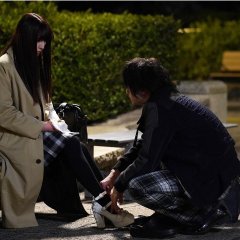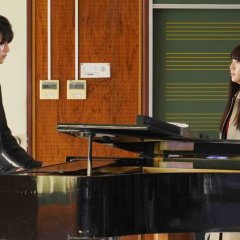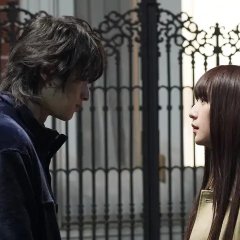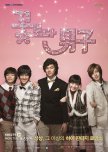 Akuma to Love Song (2021): A Review
Akuma to Love Song (2021): A Review Kawai Maria transferred to Totsuka High School after being expelled from her previous school. Upon entering the classroom and hearing the students gossip, she bluntly states that the reason for her expulsion was an act of violence against her former teacher. The sharp tongue and frank nature hidden under her pretty face immediately make her an outcast among her classmates. After all, she was told that she "taints others." Nevertheless, Maria hopes for a fresh start. She becomes close with two of her classmates after they hear her beautiful singing. One is Yusuke Kanda, who's kind and friendly to everyone on the outside, but the inside isn't that way at all. He teaches her a "lovely spin", which should help her get along with others better, but it just makes her seem even more intimidating. Maria, apparently, isn't a "lovely spin" kind of a girl. The other is Shin Meguro. He is tall, dark-haired and always frowning. Coming from a family of musicians, he knew right away which song Maria was singing. Meguro is a returnee, but Maria points out that because he lacks communication skills, he doesn't really know how to speak English. Throughout the year, Maria faces many problems, mainly relating to getting along with others, but she soon resolves them with the constant help of her friends and bluntness. (Source: MyDramaList; Wikipedia) ~~ Adapted from the manga "Akuma to Love Song" (悪魔とラブソング) by Toumori Miyoshi (桃森ミヨシ). Edit Translation
- English
- magyar / magyar nyelv
- עברית / עִבְרִית
- dansk
- Native Title: 悪魔とラブソング
- Also Known As: A Devil and Her Love Song , The Devil and Lovesongs , あくまとラブソング
- Screenwriter: Yoshida Erika, Okazaki Satoko, Hiruta Naomi
- Director: Yokoo Hatsuki
- Genres: Comedy, Romance, Youth, Drama
Cast & Credits
- Asakawa NanaKawai MariaMain Role
- Iijima HirokiMeguro ShinMain Role
- Okuno SoKanda YusukeSupport Role
- Ono KarinNakamura AyuSupport Role
- Yamanouchi SuzuKosaka TomoyoSupport Role
- Yoshida ShioriIbuki HanaSupport Role
Reviews

The Beauty Of Our True Selves!
By separating the drama from the manga, individuals can form a deeper emotional connection to the story. The writers intentionally chose to omit the sensitive topics related to Kawai's childhood and instead focused on the bonds between the group of students.The series effectively presents the struggles of embracing one's true identity. It eloquently illustrates the students' emotional progression, evoking moments of tears. The storytelling powerfully showcases the students' personal and collective development as they move through the stages of grief—denial, anger, bargaining, depression, and acceptance. Each student's distinct path towards acceptance is depicted with grace and empathy. The series highlights the inspiring and fulfilling notion that everyone is unique and worthy of love and forgiveness, irrespective of their errors, making the audience feel valued and appreciated.
Meguro and Kanda demonstrated mutual respect as they dealt with their emotions for Kawai. It was clear that they comprehended the significance of Kawai's choice. The maturity displayed by both main male characters in managing the situation was praiseworthy and commanded respect from the audience.
I found the storyline about Meguro's struggles with playing the piano somewhat overshadowed, but I still enjoyed it. The part where he finally played the piano had me sobbing so hard I had to pause between the scenes to breathe. Seeing him convey his emotional pain through beautiful music was just perfect. Understanding the deep meaning of Ave Maria made the scene much more impactful. Moreover, his being portrayed by Iijima Hiroki is the cherry on top. He has an incredible ability to evoke profound emotions in me, so the casting was spot on.
Final Thoughts:
This drama would be enjoyed by individuals who have yet to have the opportunity to read the manga or who can distinguish between the manga and the show and appreciate them as a separate entity. It would be a great pity if they missed out on the show's intended message solely because they were unfairly comparing it to the source material.
9.5 🌟 rating!



















































